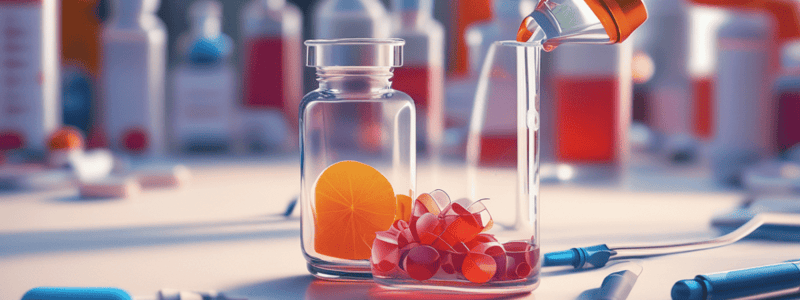Podcast
Questions and Answers
Quel est l'objectif des essais de phase IV dans le domaine des essais cliniques?
Quel est l'objectif des essais de phase IV dans le domaine des essais cliniques?
- Évaluer les effets secondaires potentiels à long terme des médicaments (correct)
- Surveiller l'efficacité à court terme des médicaments
- Déterminer l'efficacité des médicaments avant leur approbation
- Contrôler la qualité de fabrication des médicaments
Quel est l'un des défis majeurs rencontrés lors de la réalisation des essais cliniques selon le texte?
Quel est l'un des défis majeurs rencontrés lors de la réalisation des essais cliniques selon le texte?
- La publicité des essais auprès du grand public
- L'approbation rapide des protocoles par les autorités
- La documentation réglementaire et la conformité éthique (correct)
- La distribution des échantillons aux participants
Quel rôle jouent les essais cliniques dans le développement et l'approbation des produits pharmaceutiques selon le texte?
Quel rôle jouent les essais cliniques dans le développement et l'approbation des produits pharmaceutiques selon le texte?
- Ils assurent que seuls les produits répondant à des normes rigoureuses sont mis sur le marché (correct)
- Ils garantissent l'efficacité à court terme des médicaments
- Ils fournissent des informations cruciales sur la qualité de fabrication des médicaments
- Ils évaluent les effets secondaires connus des médicaments
Pourquoi la réduction du financement fédéral a-t-elle conduit à un besoin accru de partenariats dans le domaine des essais cliniques?
Pourquoi la réduction du financement fédéral a-t-elle conduit à un besoin accru de partenariats dans le domaine des essais cliniques?
Quel est l'un des facteurs qui rendent difficile le recrutement et la rétention des participants aux essais cliniques selon le texte?
Quel est l'un des facteurs qui rendent difficile le recrutement et la rétention des participants aux essais cliniques selon le texte?
Qu'est-ce qui contribue à l'amélioration de l'efficacité et de l'efficience de la recherche clinique selon le texte?
Qu'est-ce qui contribue à l'amélioration de l'efficacité et de l'efficience de la recherche clinique selon le texte?
Quel est l'objectif principal de la phase II des essais cliniques?
Quel est l'objectif principal de la phase II des essais cliniques?
Quelle est la différence principale entre la phase I et la phase III des essais cliniques?
Quelle est la différence principale entre la phase I et la phase III des essais cliniques?
Pourquoi les essais de phase III sont-ils menés sur de grands groupes de patients?
Pourquoi les essais de phase III sont-ils menés sur de grands groupes de patients?
Quelle est la principale différence entre les essais cliniques de phase II et de phase III?
Quelle est la principale différence entre les essais cliniques de phase II et de phase III?
Que cherche-t-on principalement à évaluer lors des essais cliniques de phase I?
Que cherche-t-on principalement à évaluer lors des essais cliniques de phase I?
Quel est l'objectif principal des essais cliniques de phase III?
Quel est l'objectif principal des essais cliniques de phase III?
Flashcards are hidden until you start studying
Study Notes
Introduction
Clinical trials play a critical role in the development of pharmaceuticals. They involve testing a drug or treatment on humans to determine its safety, efficacy, and optimal usage. Clinical trials can be divided into several phases, each designed to answer specific questions and ensure the drug meets certain criteria before being approved for widespread use. This article will delve deeper into the concept of clinical trials, their importance in the pharmaceutical industry, and some of the challenges faced in conducting them.
Types of Clinical Trials
There are four primary stages of clinical trials: Phase I, II, III, and IV. Each phase serves a distinct purpose in the drug development process:
-
Phase I: This initial stage involves testing the drug on healthy volunteers to assess its safety, dosage range, side effects, and basic efficacy. Small sample sizes are typically used during this stage.
-
Phase II: In this phase, the drug is tested on a larger group of patients with the specific condition it's intended to treat. The goal is to evaluate the drug's efficacy and side effects in a controlled environment.
-
Phase III: These trials are conducted on much larger patient groups across multiple clinical sites. The purpose is to confirm the drug's safety and efficacy, monitor side effects, and gather additional information on its long-term use.
-
Phase IV: Also known as post-marketing surveillance, Phase IV trials are conducted after the drug has been approved and released to the market. Their goal is to monitor the drug's long-term safety, efficacy, and any potential new side effects.
Importance of Clinical Trials
Clinical trials are essential for ensuring the safety and efficacy of pharmaceuticals. They provide valuable data on how a drug interacts with the human body, its effectiveness, and potential side effects. This information is crucial for both determining the drug's safety for public use and guiding its proper application. Furthermore, clinical trials help establish the long-term benefits and risks associated with a drug's widespread usage.
Challenges in Clinical Trials
Despite their importance, conducting clinical trials presents several challenges:
-
Recruitment and Retention: Recruiting and retaining participants can be difficult due to various factors such as time commitment, travel requirements, and potential side effects. This often leads to incomplete data sets and delays in the trial process.
-
Regulation and Ethics: Ensuring that trials meet regulatory standards and ethical guidelines can be complex and time-consuming. Compliance requires extensive documentation and oversight from multiple stakeholders, which adds to the overall cost and duration of the trial.
-
Cost and Funding: Clinical trials are expensive, with costs varying depending on the complexity of the study. Traditionally, pharmaceutical companies have been the primary funders of these studies; however, reduced federal funding has led to an increased need for partnerships between academia, industry, and other stakeholders.
In conclusion, clinical trials play a vital role in the development and approval of pharmaceuticals. They provide valuable information about a drug's safety, efficacy, and long-term use, ensuring that only products that meet rigorous standards are brought to market. Despite the challenges, advances in technology, collaboration among stakeholders, and improvements in trial methods continue to enhance the effectiveness and efficiency of clinical research, ultimately benefiting patient care.
Studying That Suits You
Use AI to generate personalized quizzes and flashcards to suit your learning preferences.




